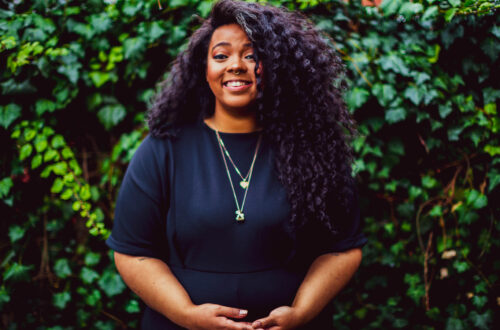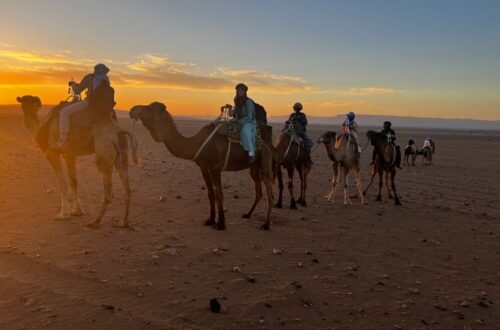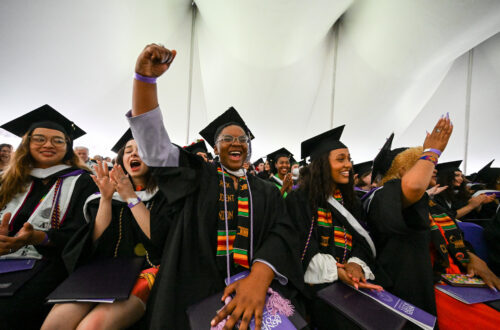Denver’s New First Lady: Courtney Huffman Johnston ’97 Embraces a Vision of Service and Impact
Denver has a Scottie as its new First Lady. Courtney Huffman Johnston ’97 will add that duty to her already busy life after her husband, Mike Johnston, is set to become the city’s mayor following a June run-off.
However, juggling a busy schedule will be nothing new for Johnston. She is the deputy district attorney for the juvenile division in Denver — she left the position of chief deputy DA about a year ago — as well as being a mom to an active family with three school-age children, living parents in town and a husband who has been in public service for years before his latest role.
Johnston has thought about the agenda she is ready to be given as First Lady of a major U.S. city, an opportunity to expand her impact in the city she calls home.
A political science major at Agnes Scott, Johnston’s life has long been focused on the public interest. Those driving values were formed in the context of her extended family, a prominent influence during her formative years. The mixture of urban and rural roots runs deep in Johnston’s family, having been born in Memphis to her native Mississippian mother.
Johnston has thought about the agenda she is ready to be given as First Lady of a major U.S. city, an opportunity to expand her impact in the city she calls home. Her vision for a healthy, functioning society includes addressing concerns many communities have nationwide, like poverty, jobs and education. Her lived experience at the intersection of urban and rural communities drives the pursuit of possible solutions.
Her roots initially drew her to Teach for America and the training in Houston, where she met Mike, a native of Vail, Colorado, in 1997. They were both assigned to the Mississippi Delta, their teaching assignments just a 90-minute mix tape apart courtesy of Courtney’s better music taste. The two then headed to Harvard University for graduate school, where Courtney studied human development and psychology — specifically childhood trauma — while Mike entered a program for aspiring school administrators.
After Harvard, Courtney needed a break from the northeast, so she returned to Atlanta, where she became a caseworker for the Department of Family and Children’s Services (DFACS), working with teenagers aging out of foster care but needing more long-term solutions.
It was a job she loved deeply.
“Teenagers are truth-tellers,” she says. “They have their finger on the pulse of issues of the day.”
Courtney and Mike were still serious about one another, and he had thoughts about returning to Colorado. Courtney recognized that if Colorado was in her future, she wanted to be sure that her future remained hers. While Mike was still in the northeast in law school, Courtney moved west in 2002.
Her first job was with was as a therapist at Third Way Center, a non-profit founded on the principles of community-based, justice-focused and trauma-informed mental health care founded by a mentor Hildegard Messenbaugh. She soon became the lead at a location serving teen moms. When Mike rejoined her in Colorado two years later, he became the principal at the school that served the Third Way Center.
It was here where Courtney started the next chapter of her life and career, seeing a fundamental disconnect in how family trauma was addressed in our criminal justice system or not. She saw firsthand how many kids were impacted in this way and how criminal cases had roots in family trauma or violence.
“Family violence is so different from street crime or other crimes,” said Courtney. “We need to be able to hold mixed emotions about juvenile offenders and those who work with this population in the criminal justice system need expertise in trauma, child development and family relationships. This is what drove me to law school.”
Working as a prosecutor as a means to pursue her interest in supporting and serving kids and helping to address their trauma, Courtney led the family violence unit. She still spends much time there even though she is no longer in the chief deputy DA role. She is trying to influence the system for good.

This leads to her newest role, one she is still grasping–and one that still feels surreal to her, but she is eager for the more prominent platform. Part of the agenda she wants to put forward as First Lady is a monthly day of service for all Denverites. She cites the inspiration of a family trip to Zambia and Rwanda last summer that included their kids and her and Mike’s moms. Civilian service (mandatory in that case, with an authoritarian dictatorship in power) made for an international capital city that stood out against even American cities for its cleanliness.
Giving a shout-out to Agnes Scott, she mentions her involvement in the Colorado Scotties alumnae group, where “Scotties Give Back” alumnae service projects have been one of her ways of staying connected. Like all Scotties, Courtney’s experiences and pursuits are multi-dimensional. She credits Agnes Scott for creating a diverse community of students when she was a studying — before it was grabbing headlines — and how the college has reinvented itself over the years while maintaining its vital core mission as the women’s college that greatly influenced her life.
Experiences like these have clarified for Courtney what could be done to help get the all hands needed working in unison. Her vision for her term as First Lady includes supporting civic volunteerism as one avenue to address the “buckets of work” that need doing in cities. She shared a dream of a monthly “Day of Service” program that could include children, families, seniors – “Everyone can serve. How can we make service more easily accessed and user friendly?”
Sharing projects for addressing homelessness in Denver — her husband’s biggest challenge as he prepares to step into the mayoral role — she told about a “tiny home village” in the Park Hill area of Denver. There, a community has been created that houses 60 people, with a special focus on vulnerable populations of women, trans and nonbinary residents. The homes themselves were built by high school shop students in the nearby Cherry Creek schools, outfitted with electricity and heat, and nestled around a central courtyard where supportive programming is offered.
These inspiring visions, alongside a wealth of experience in doing the work, are informing her as she is making her plan for what might be doable in her role as First Lady.




